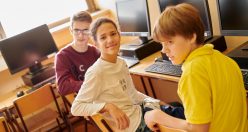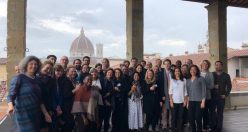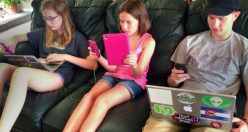Search Global Kids Online
-

Brazil: mobile-only internet use grows
5th December 2019
The 7th edition of the ICT Kids Online Brazil survey was recently launched by the Regional Center for Studies on the Development of the Information Society (Cetic.br). Drawing on a nationally representative survey with 2,964 internet-using children aged 9 to 17 and one of their parents, the Brazilian study is the longest-running in the Global Kids Online network with annual waves since 2012.
-

Should we include more digital technologies in teaching?
7th November 2019
Montenegro is the first Global Kids Online country to produce comparable data on digital skills including children, parents and teachers. A national survey conducted by Ipsos, supported by UNICEF and Telenor, found that almost all teachers (94%) in Montenegrin primary and secondary schools use the internet on a daily basis. Educators tend to have better digital skills than children and parents. While teachers agree that the use of technologies improves the quality of education, many struggle to integrate diverse ways of using digital media in the learning process.
-

Online on the phone: Czech children’s internet use
5th August 2019
A survey of 2,825 Czech children showed that 84% access the internet daily using their mobile phones and only 45% use a computer. Even the youngest children aged 9 to 10 years use predominantly their phones to go online (64% use it daily), while 29% of all children say that they are online on their mobile ‘almost all the time’. How does this affect their experiences and exposure to risk?
-

Using Global Kids Online evidence to build global understanding and action
18th July 2019
A recent Global Kids Online network meeting gathered 45 experts and practitioners from 27 countries to discuss the advancement of child rights and online protection drawing on existing and new research evidence by the network partners. We are following up with a webinar on impact and the lessons learned on how to use the evidence to build global understanding and action (Tuesday 23rd July, registration open).
-

How do Norwegian children understand the internet?
5th March 2019
While children in Norway are often referred to as ‘digital natives’, new research by EU Kids Online suggests that this is an inappropriate term. It discovered that, although children often understand concepts related to the internet, they can’t always apply the practical skills related to those concepts. The findings suggest that children may need more support online.
-

Impact work in Bulgaria: using evidence to promote digital literacy
27th October 2017
Using the evidence from the Global Kids Online study, the Applied Research and Communication Fund chose strategic priorities for their knowledge exchange and impact efforts. Selecting a focus on children’s digital and media literacy, the Fund now utilises a number of long-term partnerships and collaborations towards the effective creation of new educational and training opportunities.
Popular tags








